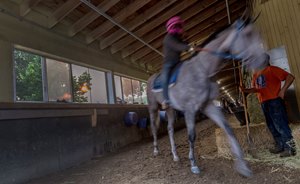Air Quality Protocols Established for NY Horse Industry


New York Gov. Kathy Hochul announced June 8 enhanced measures to protect horses at New York State racetracks as smoke and haze from ongoing Canadian wildfires continue to impact air quality throughout the state.
The announcement comes two days before the scheduled running on the June 10 Belmont Stakes (G1) at Belmont Park, which canceled racing Thursday.
"As New Yorkers continue to experience unhealthy air quality as a result of Canadian wildfires, we must all work to ensure that animals—including these peak-performance equine athletes—are protected," Hochul said. "The measures being implemented at tracks across New York State are effective steps to keep all those who participate in the sport safe now and into the future."
Hochul on June 7 encouraged New Yorkers to postpone any outdoor activities in impacted regions until conditions improve. Accordingly, the New York State Gaming Commission directed all tracks to stop all racing, training. and workouts until further notice. The Gaming Commission continues to monitor air quality and rely on guidance from veterinary experts to ensure any decision to resume racing is based solely on the best interest of the horse population.
The Gaming Commission has established measures tied to the U.S. Environmental Protection Agency's air quality index. The AQI includes a range of index values. The higher the AQI value, the greater the health concern:
- If the AQI exceeds 200 at a specific facility, no racing or training may be conducted at that track.
- If the AQI is between 150 and 200 at a specific facility, only those horses that pass an additional pre-race respiratory veterinary examination will be permitted to race.
"This guidance was arrived at in consultation with the New York Racing Association and is grounded in our shared efforts to provide the safest possible environment for training and racing Thoroughbred horses throughout New York State," said Pat McKenna, NYRA's vice president of communications. "NYRA will continue to closely monitor air quality in and around Belmont Park in the coming days, and we remain optimistic that conditions will allow for the resumption of training and racing on Friday."
Gaming Commission equine medical director Dr. Scott Palmer, is directing all Thoroughbred and Standardbred racetracks in the state to implement additional protocols based upon the track's AQI, which considers the amount of particle pollution, ground-level ozone, and toxic gases (carbon monoxide, sulfur dioxide, and nitrogen dioxide) in the air. The AQI varies from location to location and changes throughout the day.
As with humans, particulates in the atmosphere can build up in horse respiratory systems causing serious health problems, including eye and respiratory tract irritation. Poor air quality can irritate pre-existing conditions, including recurrent airway obstruction (heaves), as well as exercise-induced pulmonary hemorrhage. High concentrations of smoke and particulates can cause persistent cough, nasal discharge, wheezing, an increased effort to breathe, and altering of the immune system.
All parties interacting with horses are urged to review veterinary guidelines for smoke/extreme weather:
UC Davis guidelines for horses exposed to wildfire smoke
Equestrian Canada's guidelines for equine competition and training during extreme environmental conditions
Effective immediately:
While the AQI is under 150:
- Horsepersons should monitor their horses for signs of respiratory inflammation and contact their attending veterinarian to evaluate horses exhibiting coughing, respiratory distress, nasal discharge, or fever.
- It is otherwise safe to exercise or race horses at these AQI levels.
Once the AQI reaches 150:
- The chief veterinarian of the track at which training or racing is conducted must inform the stewards or presiding judges and track management of an elevated AQI.
- The chief veterinarian, stewards or presiding judges, horsepersons, jockeys, drivers, outriders, and racetrack management must collectively determine whether to cancel racing.
- The steward or presiding judge and equine medical director retains authority to unilaterally intervene, as they determine circumstances warrant.
If the AQI is between 151 and 200:
- No horse will be allowed to workout or race unless their attending veterinarian certifies that the horse will not be adversely affected by the elevated AQI.
- If an entered horse evidenced a respiratory issue, the horse must be declared unfit and scratched without penalty.
- Under present practice, the horse would be placed on the Veterinarian's List when scratched.
- Horses declared fit to race must be closely scrutinized before and after racing to ensure that they are not experiencing clinical signs of respiratory distress.
- Pre-race examinations of association veterinarians should include auscultation of the lungs and airways.
If the AQI reaches 201:
- No racing or training may be conducted.
